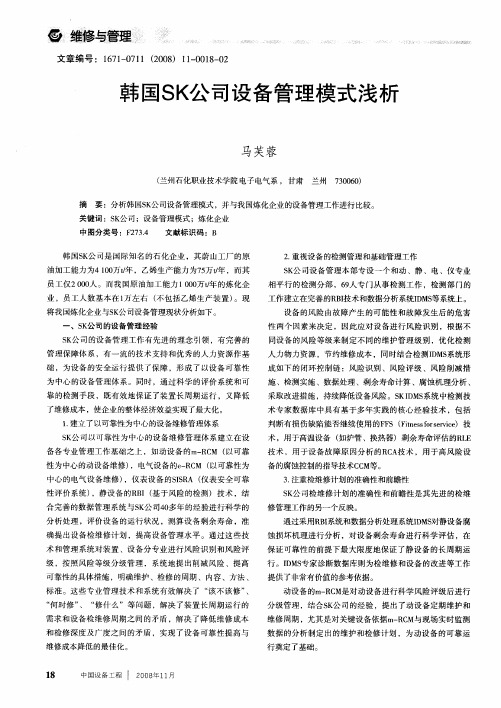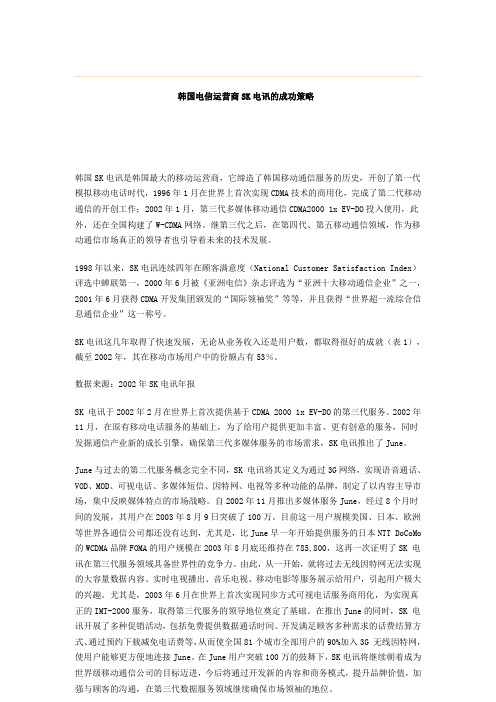韩国SK公司研修报告
- 格式:ppt
- 大小:3.01 MB
- 文档页数:75


SK企业内部审计研究共3篇SK企业内部审计研究1SK企业内部审计研究近年来,企业管理越来越重视内部审计的作用。
对于SK企业而言,内部审计是提高管理效率、防范和解决风险、保护企业利益的有力工具。
本文将会探讨SK企业内部审计的概念、作用和执行方式等,进一步认识内部审计对SK企业发展的重要性。
一、内部审计的概念内部审计是指在企业内部,由专业审计人员开展的有计划、有组织的审计活动,旨在评估企业管理体系及其有效性、风险管理、内控体系等,发现问题并给出建议以提升管理效率、提高控制效力等。
内部审计通常是由企业内部审计部门、内部审计委员会等独立机构承担的。
二、SK企业内部审计的作用1.提升管理效率SK企业将内部审计作为重要的管理工具,从而帮助企业识别和解决管理中的各种问题,提升管理效率。
审计人员通过对企业各个部门的审计,识别管理上的弱点和风险,为企业提供管理方面的具体建议,帮助企业高效运营并提高企业的竞争力。
2.防范和解决风险现代企业面临各种内外部风险,在风险管理方面,内部审计起到了至关重要的作用。
SK企业依靠内部审计,可以发现并解决企业内部潜在的风险,避免企业被潜在的危机所吞噬,并保障企业的健康发展。
3.保护企业利益内部审计不仅是保障企业风险管控的工具,还是保护企业利益和品牌声誉的重要手段。
企业内部审计人员通过对企业的各种采购、采购成本、资产负债表等重要合规性资料的审查,验证企业合规性,保障企业利益和金融市场稳定有序。
三、SK企业内部审计的执行方式内部审计主要包括:审计范围、审计计划、审计评价、整改跟发等环节。
1.审计范围内部审计的范围包括品牌控制、营运流程、财务管理等多个方面,在执行过程中,审计人员对于不同环节的审核范围不同,但是目的都是为了识别企业管理体系的问题,预防和纠正风险。
2.审计计划企业内部审计部门需要制定合理的审计计划。
审计计划旨在确保内控体系一致、取得审计意见,识别和衡量风险水平等方面得到有效处理,它是企业内部审计的基础,并确保审计能被尽有效,高质量的实施。

韩国企业实习报告总结一、前言在过去的三个月里,我有幸参加了中国某知名企业与韩国某企业合作举办的实习生交流项目。
该项目旨在让我们深入了解韩国企业的文化、经营模式和管理理念,为今后在国际职场中发展奠定基础。
在这次实习过程中,我充分感受到了韩国企业的独特魅力,也收获了许多宝贵的经验和启示。
现将实习报告总结如下。
二、实习单位简介实习单位为韩国某知名企业,成立于1990年,是一家以电子、通信和家电为主导的全球性企业。
企业员工超过2万人,业务遍及全球100多个国家和地区。
该公司在技术创新、产品质量、市场营销等方面具有显著优势,是韩国企业的代表之一。
三、实习内容及收获1. 实习内容在实习期间,我主要负责以下工作:(1)参与产品研发项目,与韩国同事共同开展研究工作;(2)跟进生产进度,协调各部门之间的沟通;(3)参加企业内部培训,提升专业技能;(4)协助市场营销部门进行市场调研和数据分析。
2. 实习收获(1)技术创新意识韩国企业非常重视技术创新,企业内部设有大量的研发部门和实验室。
在实习过程中,我深刻体会到韩国同事对技术研究的热情和专注。
他们不断尝试新的方法,勇于挑战传统观念,追求产品的极致性能。
这种创新意识使我受益匪浅,也为我今后的工作提供了新的思路。
(2)团队合作精神韩国企业强调团队合作,企业内部氛围浓厚。
在实习期间,我参与了多个团队项目,与韩国同事共同解决问题。
大家相互支持、相互信任,共同为项目的成功付出努力。
这种团队精神使我更加明白了团队协作的重要性。
(3)严谨的工作态度韩国企业员工具有严谨的工作态度,对待每一个工作细节都力求完美。
在实习过程中,我学会了如何仔细分析数据、严谨论证方案。
这种工作态度对我今后的工作和生活都产生了积极的影响。
(4)国际化视野韩国企业在全球范围内设有生产基地和销售网络,具有浓厚的国际化色彩。
在实习过程中,我接触到了来自不同国家和背景的同事,学会了如何与他们沟通、协作。
这使我更加具备国际化视野,为今后在国际职场中发展奠定了基础。

Executive Summary:This report outlines my internship experience at a leading Korean company, focusing on the various aspects of my professional development, cultural immersion, and the practical application of my academic knowledge. The internship provided me with a unique opportunity to understand the business practices and corporate culture in South Korea, as well as to enhance my skills in a global business environment.Introduction:The internship at [Company Name], a renowned company in the [Industry Sector], was a significant milestone in my academic and professional journey. With a background in [Your Major], I aimed to gain practical experience that would complement my theoretical knowledge and prepare me for future career opportunities. The internship duration was from [Start Date] to [End Date], during which I was exposed to a diverse range of responsibilities and challenges.Objective:The primary objectives of my internship were:1. To gain hands-on experience in the [Industry Sector].2. To understand the corporate culture and business practices in South Korea.3. To enhance my communication, teamwork, and problem-solving skills.4. To apply my academic knowledge in a real-world setting.Company Overview:[Company Name] is a leading [Industry Sector] company in South Korea, known for its innovative products and exceptional customer service. The company operates in [Number of Countries] across the globe, with a strong presence in the [Region/Market] market. It is renowned for its commitment to sustainability and social responsibility.Internship Responsibilities:During my internship, I was responsible for the following tasks:1. Market Research: Conducted market research to identify potential business opportunities and analyze competitor strategies.2. Data Analysis: Analyzed sales data and market trends to provide insights for decision-making.3. Project Coordination: Assisted in the coordination of various projects, including [mention specific projects].4. Communication: Prepared reports and presentations for senior management, and coordinated with internal and external stakeholders.5. Cross-Cultural Collaboration: Collaborated with colleagues from diverse cultural backgrounds to achieve common goals.Professional Development:1. Communication Skills: The internship provided ample opportunities to improve my communication skills, both written and verbal. I was responsible for preparing and delivering presentations to senior management, which helped me develop confidence and clarity in my communication.2. Problem-Solving Skills: The challenges I faced during the internship required me to think critically and creatively. I learned to analyze complex situations, identify potential solutions, and implement them effectively.3. Teamwork: The internship emphasized the importance of teamwork, and I had the opportunity to work with a diverse group of colleagues. This experience taught me how to collaborate effectively and leverage the strengths of each team member.4. Cultural Immersion: Being in South Korea allowed me to immerse myself in a new culture, which broadened my perspective and enhanced my adaptability.Cultural Insights:1. Work Culture: The Korean work culture is known for its long hours and strong emphasis on loyalty and respect. I learned to appreciate the importance of these values and adapted to the work environment accordingly.2. Language Barrier: While I was proficient in Korean, I encountered challenges due to the language barrier. This experience taught me the importance of patience and perseverance in overcoming such obstacles.3. Etiquette: Understanding Korean business etiquette was crucial for my success during the internship. I learned about the importance of hierarchy, formality, and respect in Korean business interactions.Conclusion:My internship at [Company Name] was an invaluable experience that has significantly contributed to my personal and professional growth. The opportunity to work in a dynamic and culturally diverse environment allowed me to develop a wide range of skills and insights. I am grateful for the knowledge, experience, and friendships I gained during this period, and I look forward to applying these learnings in my future endeavors.Recommendations:Based on my experience, I recommend the following:1. To provide language training or cultural workshops for international interns to help them better adapt to the local environment.2. To encourage more cross-departmental collaboration to foster a diverse and inclusive work culture.3. To continue promoting the importance of sustainability and social responsibility within the company.Acknowledgments:I would like to express my sincere gratitude to [Company Name] for providing me with this incredible opportunity. I am particularlythankful to [Supervisor’s Na me], who guided and supported me throughoutthe internship. Additionally, I would like to thank my colleagues for their valuable insights and friendship.Appendices:- Internship Timeline- List of Responsibilities- Feedback from Supervisor and Colleagues---This report serves as a testament to the enriching experience I had during my internship at [Company Name]. I hope that my insights and reflections will be beneficial to others seeking similar opportunities in the future.。

IntroductionAs a student pursuing a degree in International Business, I had the incredible opportunity to embark on an internship in South Korea, one of the fastest-growing economies in the world. The internship, which lasted for three months, provided me with invaluable insights into the corporate culture, business practices, and the unique challenges and opportunities of the Korean market. This report aims to summarize my experience, highlighting the key learnings, challenges faced, and the overall impact of the internship on my personal and professional development.Company BackgroundThe company where I interned, "Tech Innovations Korea" (TIK), is a leading provider of cutting-edge technology solutions in the field of renewable energy. Headquartered in Seoul, TIK has a global presence and operates in various countries across Asia. The company is known for its innovative approach to technology and its commitment to sustainability.Internship ResponsibilitiesDuring my internship, I was assigned to the Marketing Department, where I was responsible for the following tasks:1. Market Research: Conducting thorough market research on potential customers, competitors, and market trends in the renewable energy sector.2. Content Creation: Developing and writing marketing materials such as press releases, blog posts, and social media content.3. Event Planning: Assisting in the organization and execution of company events, including trade shows and seminars.4. Data Analysis: Analyzing sales data and customer feedback to identify areas for improvement and to inform future marketing strategies.Key Learnings1. Cultural Insights: One of the most significant learnings from my internship was the exposure to Korean culture and corporate culture. Ilearned the importance of respect, hierarchy, and group harmony in Korean business practices. This understanding was crucial in navigating the workplace and building positive relationships with my colleagues.2. Language Skills: Although I had basic knowledge of Korean before the internship, the opportunity to work in a Korean environment greatly improved my language skills. I learned to communicate effectively in Korean and gained a deeper understanding of the language's nuances.3. Marketing Strategies: Working in the marketing department allowed me to gain practical experience in developing and implementing marketing strategies. I learned about the importance of target audience analysis, content marketing, and social media engagement in promoting a company's products and services.4. Adaptability and Problem-Solving: The internship demanded a highlevel of adaptability and problem-solving skills. I encountered various challenges, such as language barriers and cultural differences, which taught me to think on my feet and find creative solutions.Challenges Faced1. Language Barrier: Initially, the language barrier was a significant challenge. However, with the help of language courses and my colleagues, I gradually improved my Korean language skills, which made communication easier.2. Cultural Differences: Adapting to Korean corporate culture was challenging. I had to learn about the importance of hierarchy, respect, and group harmony. This required me to modify my behavior and approach to work to align with Korean norms.3. Workload: The internship involved a heavy workload, which required me to manage my time effectively and prioritize tasks. This experience taught me valuable time management skills.Impact on Personal and Professional Development1. Increased Confidence: The internship significantly boosted my confidence in my ability to work in a diverse and challengingenvironment. I feel more prepared to take on future professional challenges.2. Networking: I had the opportunity to network with professionals from various backgrounds, which expanded my professional network and provided me with valuable contacts for future opportunities.3. Enhanced Skills: The internship enhanced my skills in market research, content creation, event planning, and data analysis. These skills are highly relevant to my field of study and will be beneficial in my future career.ConclusionIn conclusion, my internship in South Korea was an enriching experience that provided me with invaluable insights into the business world, Korean culture, and my own capabilities. The challenges faced and the skills acquired during the internship have prepared me well for myfuture career in international business. I am grateful for the opportunity to have gained this experience and would highly recommend it to any student seeking to broaden their horizons and gain practical experience in a global business environment.。

韩国电信运营商SK电讯的成功策略韩国SK电讯是韩国最大的移动运营商,它缔造了韩国移动通信服务的历史,开创了第一代模拟移动电话时代,1996年1月在世界上首次实现CDMA技术的商用化,完成了第二代移动通信的开创工作;2002年1月,第三代多媒体移动通信CDMA2000 1x EV-DO投入使用,此外,还在全国构建了W-CDMA网络。
继第三代之后,在第四代、第五移动通信领域,作为移动通信市场真正的领导者也引导着未来的技术发展。
1998年以来,SK电讯连续四年在顾客满意度(National Customer Satisfaction Index)评选中蝉联第一,2000年6月被《亚洲电信》杂志评选为“亚洲十大移动通信企业”之一,2001年6月获得CDMA开发集团颁发的“国际领袖奖”等等,并且获得“世界超一流综合信息通信企业”这一称号。
SK电讯这几年取得了快速发展,无论从业务收入还是用户数,都取得很好的成就(表1),截至2002年,其在移动市场用户中的份额占有53%。
数据来源:2002年SK电讯年报SK 电讯于2002年2月在世界上首次提供基于CDMA 2000 1x EV-DO的第三代服务。
2002年11月,在原有移动电话服务的基础上,为了给用户提供更加丰富、更有创意的服务,同时发掘通信产业新的成长引擎,确保第三代多媒体服务的市场需求,SK电讯推出了June。
June与过去的第二代服务概念完全不同,SK 电讯将其定义为通过3G网络,实现语音通话、VOD、MOD、可视电话、多媒体短信、因特网、电视等多种功能的品牌,制定了以内容主导市场,集中反映媒体特点的市场战略。
自2002年11月推出多媒体服务June,经过8个月时间的发展,其用户在2003年8月9日突破了100万。
目前这一用户规模美国、日本、欧洲等世界各通信公司都还没有达到,尤其是,比June早一年开始提供服务的日本NTT DoCoMo 的WCDMA品牌FOMA的用户规模在2003年8月底还维持在785,800,这再一次证明了SK 电讯在第三代服务领域具备世界性的竞争力。
2018年SK集团发展分析报告2018年7月目录一、SK集团:撑起韩国经济的五大巨头之一 (4)1、韩国最大的综合能源化工集团 (4)2、SK Innovation和SK Holdings:集团两大支柱 (8)二、顺应政府号召,三次腾飞成就聚酯巨头 (10)1、第一次腾飞:从织物到聚酯,进军纤维产业 (12)(1)韩国政府鼓励发展轻工业,经济飞速增长 (12)(2)SK抓住发展机遇,实现首次腾飞 (13)2、第二次腾飞:开拓石油事业,完成产业链纵向整合 (15)(1)韩国政府大力发展重化工业,实施出口导向战略 (15)(2)进军炼化产业,布局化工业务 (15)(3)拓宽海外市场,积极探索 (18)3、第三次腾飞:布局信息通讯,走进高新技术产业 (19)(2)SK抓住发展机遇,进军信息通讯业 (20)(2)SK电讯:韩国最大的移动通信运营商 (20)三、SK集团发展历程对我国化工企业的启示 (22)1、中韩经济发展具有一定的相似性 (22)(1)政府主导型的市场经济 (22)(2)迅速升级的产业结构 (23)2、我国化工企业发展的启示 (24)(1)顺应政府号召,把握市场动向 (25)(2)发挥产业链优势,纵向整合提升全球竞争力 (26)SK集团作为韩国五大巨头之一,见证了整个韩国石化产业的发展与崛起。
他从一个织造小作坊逐步成长为韩国最大的综合能源化工集团,其历史经验值得我们挖掘与借鉴。
◆回顾SK集团的发展历程,我们可以看到如下几点经验:第一、顺应政府号召,从织物到聚酯二战后和朝鲜战争后,韩国政府为了推动国家快速发展,采取“以轻(工业)育重(工业)”战略,即以轻工业为核心,劳动密集型产品为重点,建立和发展民族工业。
在这一时期,SK在政府号召下成功抓住机遇,努力筹备资金购买设备,克服困难进行产品研发,从一个小型的织造作坊转型成聚酯纤维的生产企业,逐渐发展了起来。
第二、开拓石油事业,纵向整合产业链20世纪70年代,韩国政府集中力量发展重工业,开始了从轻工业向重工业的转型之路。
韩国SKGroup:不只半导体,化工更出彩能源化工占据SK半壁江山目前,SK集团的主营业务主要分能源/化工、信息通讯/半导体、营销/服务三大块,其中能源/化工为第一大板块,占比45%。
主要涉及从原油到化纤的全产业链化工产品以及电动汽车电池、环保材料、制药和生物等革新性技术产品。
信息通讯与半导体板块占比37%。
▲SK三大业务板块;来源:公司公告,最有料公司三大块业务旗下公司业务分别涉及不同行业,能源化工板块旗下10家公司,其中SK Innovation涉及石油开发、动力电池,润滑油、电子材料等业务。
SK能源作为SK集团旗下的的子公司,是韩国首屈一指的炼油企业。
蔚山Complex每天炼油能力达84万桶,各种石油产品从我们的蔚山Complex销往全球各地。
信息服务和半导体领域旗下9家公司,其中SK 海力士拥有30多年的半导体生产经验,主要经营DRAM、NAND闪存和CIS 2017年营业外30万亿韩元,成为仅此于三星的全球第二大存储芯片制造商。
▲SK集团子旗下子公司及业务简介;来源:公司官网,最有料▌SK InnovationSK Innovation(SK 创新)成立于1962 年,前身为韩国首家炼油、化工企业——大韩石油,曾经是带动70 年代韩国经济发展的主力军。
目前,公司涉及业务包括石油开发、炼油、化学、润滑油以及未来能源产业,并下设SK能源、SK 综合化学、SK润滑油、SK 仁川石化、SK Trading International等子公司,已成长为韩国最具代表性的国际能源、化学企业。
2017年销售收入46.3万亿韩元,约合432亿美元(当前汇率),净利润2.1万韩元,折合美元18亿美元。
石油部门是公司最大的业绩部门,营收占比高达74%,占比55%。
其次为化学品部门,营收占比 21%。
▲2012-2017年公司营业收入(亿美元)。